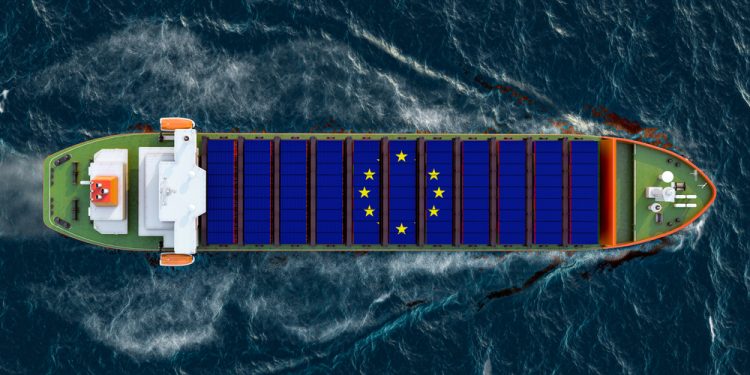ECSA welcomed the cross-party support by the European Parliament for key provisions under the revised Emission Trading System for shipping.
European Parliament pushes for EU action
On May 17, the Committee on Environment, Public Health and Food Safety adopted five reports of the “Fit for 55 in 2030 package”. This is the EU’s plan to reduce greenhouse gas emissions by at least 55% by 2030 compared to 1990 levels and have net zero greenhouse gas (GHG) emissions (climate neutrality) by 2050 in line with the European Climate Law.
More specifically, the European Parliament wants to incentivise industries to further reduce their emissions and invest in low-carbon technologies. The Emissions Trading System (ETS) should be reformed, including:
- New ETS II for buildings and road transport – citizens not to be included before 2029
- Free allowances to be phased out from 2026 and disappear by 2030
- A bonus-malus system to be introduced from 2025
- Revenues to be used exclusively for climate action in EU and member states.
The Parliament also calls for a broader scope and faster implementation of the EU Carbon Border Adjustment Mechanism (CBAM) to prevent carbon leakage and raise global climate ambition, including:
- Phasing in CBAM earlier and ending free allowances in EU ETS by 2030
- Scope to be extended to include organic chemicals, plastics, hydrogen and ammonia as well as indirect emissions
- EU budget to support least developed countries through amounts equivalent to sums collected through CBAM
- Need for a centralised EU CBAM authority.
Member of the European Parliament (MEPs) also amended EU effort-sharing legislation, covering GHG emissions in sectors not included in the ETS, representing roughly 60% of EU emissions. For the first time, all EU member states would have to reduce greenhouse gas emission with targets ranging between 10-50%. MEPs call for more transparency and less flexibility to borrow, bank and transfer emissions allowances.
Regarding shipping, Reuters reports its emissions would be fully covered by the carbon market from 2024, two years earlier than the original proposal by the European Commission, which drafts EU laws.
What is more, the ‘charterer-pays’ clause and the Ocean Fund are also included, however the scope would increase from 50% to 100% of extra-EU voyages by 2028, while the phase-in period is out.
Furthermore, the environment committee agreed to end allocation of free emissions permits by 2030 and lower the ceiling on the total that can be granted.
ECSA supports provisions
Now, ECSA welcomed the Parliament’s commitment to enforce the ‘polluter-pays’ principle, by ensuring the mandatory pass-through of the ETS costs to the commercial operators of the vessels through contractual clauses.
ECSA also supports the proposal of the Parliament to create a sector-dedicated fund and to earmark 75% of the revenues generated by the shipping allowances to the energy transition of the sector.
The mandatory pass-through of the ETS costs to the entities responsible for operational decisions will ensure the proper implementation of the ‘polluter pays’ principle. Although the position of the Parliament needs to be improved on certain points, it is a significant step forward
said Philippos Philis, ECSA’s President.
Moreover, Sotiris Raptis, ECSA’s Secretary-General, added that “a lot of work still needs to be done but the outcome of the vote today is a strong signal that the European policy-makers are keen to listen to the proposals of the shipping sector.”
As he explained the earmarking of the revenues is essential to finance R&D projects and to bridge the price gap between cleaner and conventional fuels.
It’s a make-or-break moment for the decarbonisation of shipping and the competitiveness of the sector
stated Sotiris Raptis.
The Parliament has also presented a proposal to address the issue of the ice-class vessels, which is one of the elements highlighted by ECSA’s position. In this regard, European shipowners look forward to engaging with the Parliament and the Council to reach an adequate solution.
The proposals were supported by an overwhelming majority in the Environment Committee (proposal on the commercial operator: 76 in favour – 3 against – 9 abstentions & proposal on the fund: 68 in favour – 20 against).
The final vote at the Plenary of the European Parliament is scheduled for June. Negotiations between the Parliament and the Council will be launched once the two institutions adopt their positions.
Earlier this year, the EU Parliament’s Rapporteur Peter Liese, published his draft report on a proposal to revise the Emissions Trading System (ETS) Directive, proposing the following:
- Full reporting on emissions to commence in 2025;
- 100% of non-EU emissions from ships calling at EU ports to be caught if IMO fails to introduce a similar global measure by 2028;
- ‘Time charterers’ now expressly included in the definition of ‘Shipping Company’;
- ETS responsibility and payment of final price to fall on the commercial operator who may not always be the Shipping Company;
- ‘Operation of the ship’ is now also expressly defined for the purposes of the contractual allocation clause;
- Establishment of an ‘Ocean Fund’ is recommended to fund R&D into maritime decarbonisation, cleaner fuels, short-sea shipping and cleaner ports.

































































